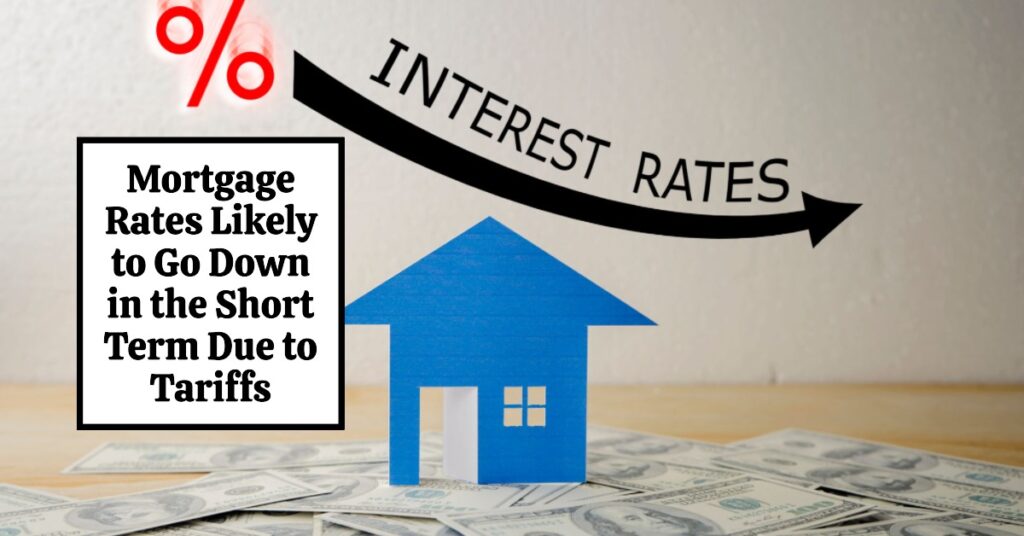By David Patel
August 24, 2025
Washington, D.C. – Mortgage rates have taken a sharp dive following the Trump administration’s recent tariff announcements, offering a potential lifeline for prospective home buyers navigating a historically unaffordable housing market. As the average 30-year fixed mortgage rate dropped to 6.55% from 6.75% between Wednesday and Friday, according to Mortgage News Daily, industry experts are weighing the implications of this unexpected shift. While lower rates could boost purchasing power, the broader economic fallout from tariffs may complicate the home buying journey.
Why Are Rates Falling?
The decline in mortgage rates is closely tied to market reactions to President Donald Trump’s tariff policies, announced in early April 2025. The imposition of a 10% baseline tariff on all imported goods, with higher duties on specific countries like China (145%), triggered a stock market sell-off and drove investors to seek safety in U.S. Treasury bonds. This surge in bond demand pushed the 10-year Treasury yield below 4% on Friday, April 4, its lowest since October 2024, according to Business Insider. Since mortgage rates loosely track the 10-year Treasury yield, this shift has led to a significant drop in borrowing costs.
“Investors are spooked by the potential for a trade war and economic slowdown,” said Matthew Graham, chief operating officer at Mortgage News Daily. “When they flock to bonds, yields drop, and mortgage rates follow.” The result is a rare window of opportunity for home buyers, with rates hitting a six-month low, down from a peak of 7.26% in January 2025.
A Boost for Home Buyers
Lower mortgage rates translate directly into greater affordability. For a $400,000 home with a 20% down payment, the monthly payment on a 30-year fixed mortgage at 6.55% is approximately $2,038, compared to $2,142 at 6.75%—a savings of $104 per month, or over $37,000 over the life of the loan. This relief is particularly significant as the National Association of Realtors reported a median existing-home price of $398,400 in February 2025, with new homes averaging $459,826.
The timing aligns with the spring home buying season, traditionally the busiest period for real estate. “Lower rates could lure hesitant buyers off the sidelines,” said Danielle Hale, chief economist at Realtor.com. Posts on X reflect cautious optimism, with one user noting, “Mortgage rates at 6.55%? Might finally be time to lock in before tariffs mess things up again.” Another wrote, “This dip is a gift for first-time buyers, but don’t expect it to last.”
The Tariff Trade-Off
While falling rates are a boon, tariffs introduce significant challenges. The National Association of Home Builders estimates that duties on imported materials like lumber and steel could raise the cost of constructing a new home by an average of $9,200. With new construction comprising nearly half of available inventory in 2025, per real estate firm Cotality, these costs could offset savings from lower rates. “Tariffs are a double-edged sword,” said Peter Carroll, executive vice president at Cotality. “Cheaper borrowing helps, but higher home prices hurt affordability.”
Additionally, tariffs may fuel inflation, potentially reversing the downward trend in rates. The Consumer Price Index reported a 2.8% inflation rate in February 2025, with shelter costs remaining stubbornly high. “If goods prices rise due to tariffs, inflation could spike, pushing the Federal Reserve to keep interest rates high or even raise them,” warned Melissa Cohn, regional vice president at William Raveis Mortgage. This concern is echoed on X, where a user posted, “Lower rates now, but wait until tariff costs hit—mortgages could climb back to 7%.”
Economic uncertainty also looms large. Goldman Sachs recently raised its 2025 recession probability to 35%, citing tariff impacts, while J.P. Morgan pegged it at 40%. If consumer confidence wanes or layoffs increase, as suggested by rising jobless claims in Q1 2025, buyers may hesitate to commit despite lower rates.
Strategies for Home Buyers
For those looking to capitalize on the current dip, experts offer practical advice:
- Lock in Rates Early: Mortgage rates are volatile, with CNBC reporting a 29-basis-point jump to 6.92% by April 10 after a brief tariff pause. “Don’t wait for rates to fall further—lock in now,” advised Tim Stafford, a mortgage broker at Edge Home Finance.
- Shop Around: Comparing offers from multiple lenders can yield savings, as even a 0.25% difference adds up over time.
- Assess Your Finances: With tariffs potentially cooling the labor market, ensure job stability before committing to a mortgage.
- Consider Alternatives: Refinancing could be viable for those with rates above 7%, though experts recommend securing at least a 1% reduction to offset closing costs, per Forbes.
Looking Ahead
The mortgage rate drop offers a rare opportunity for buyers, but the outlook remains uncertain. CNN reported that rates surged to 6.83% by April 17, driven by renewed tariff fears and bond market volatility. The Federal Reserve, which has delayed rate cuts until at least September 2025, will play a critical role. “If tariffs drive stagflation—high inflation with weak growth—rates could stay elevated,” said Chen Zhao, head of economic research at Redfin.
For now, home buyers must weigh the benefits of lower rates against rising construction costs and economic headwinds. As one X user put it, “Tariffs are shaking up everything—lower rates are nice, but I’m worried about home prices and my job.” The coming months will test whether this rate tumble can truly transform the home buying journey or if tariff-related challenges will overshadow the gains.
Trending Tags: #MortgageRates, #Tariffs2025, #HomeBuying, #HousingMarket, #TradeWar, #EconomicUncertainty
David Patel is a real estate and finance reporter covering housing trends and economic policy.
Disclaimer: realnewsub.com does not promote any illegal activity. All the information given here is for educational purposes. We request all our users to please stop using illegal websites. If you are found guilty of uploading illegal content on such a platform, severe action will be taken by the government as per anti-piracy law.
